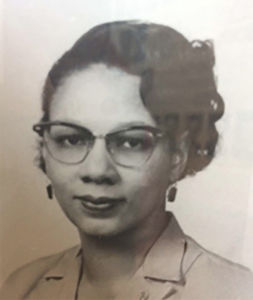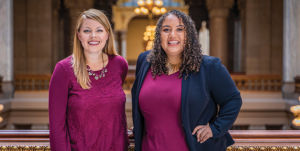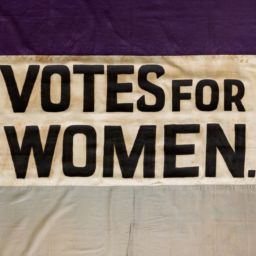
All month Indy Maven will be partnering with Indiana Humanities to shed some light on women of the suffrage movement here in Indiana and beyond. March is Women’s History Month and 2020 marks 100 years since (white) women were given the right to vote in our country. Stay tuned for many more interesting stories about the women who helped secure our rights.
One of the guiding principles of the Indiana Women’s Suffrage Centennial is to discover and share the ways Indiana women participated in politics and shaped policy before and after they got the right to vote. Our first posts in this series have focused on pre-1920 ladies; let’s now focus on more recent history.
 If an Indy Maven is a “highly engaged, badass” woman, then every person reading this needs to know the name Harriette Bailey Conn. She was a political pioneer and an incredible community leader as a black woman in the mid-20th century. At a time when few African-American women attended college, she became the first black woman to graduate from IUPUI’s law school, the first African-American woman Republican to be elected to the Indiana General Assembly, and was appointed the first African American and the first woman to serve as the state’s public defender.
If an Indy Maven is a “highly engaged, badass” woman, then every person reading this needs to know the name Harriette Bailey Conn. She was a political pioneer and an incredible community leader as a black woman in the mid-20th century. At a time when few African-American women attended college, she became the first black woman to graduate from IUPUI’s law school, the first African-American woman Republican to be elected to the Indiana General Assembly, and was appointed the first African American and the first woman to serve as the state’s public defender.
Now, thanks to University of Indianapolis professor Laura M. Wilson and her student Karlee Taylor, Bailey Conn’s overlooked story is being brought to light. They were recipients of a May Wright Sewall Fellowship, a special grant created by the Indiana Women’s Suffrage Centennial to spur research on the history of Indiana women’s involvement in politics before and after suffrage. Karlee and Laura, mavens in their own right, are now at work to dedicate a new historic marker in Bailey Conn’s honor.
Despite her array of achievements, Harriette Bailey Conn’s early life was not auspicious nor indicative of what was to come. She was born in 1922 to a comfortably middle-class family. She graduated from Crispus Attucks High School at age 14 (which was notable but not unusual at the time) and matriculated to Talladega College in Alabama before returning home upon graduation. She met and married Clifton Fulks Conn and spent the rest of her twenties growing and raising their family of seven children.
Nine years after earning her bachelor’s degree and staying home raising her children, Bailey Conn decided to enroll in law school, citing her father’s death and desire for her to pursue a legal career. “I knew that with a bachelor of arts there wasn’t anything to do without further training,” she later explained. “And it wasn’t a matter of having to go to work tomorrow, so I decided to do what I really wanted to do.”
What Bailey Conn really wanted to do was become a lawyer. With six children home at the time, she applied and was accepted into Indiana University Indianapolis’ program, taking care of her family during the day and taking classes in the evening. Her graduation was postponed one year when she gave birth to her seventh child; she ultimately completed the program in 1955 as one of the top in her class.
Upon graduation, Bailey Conn served as deputy attorney general of Indiana under Edwin K. Steers for 10 years, working on, among other things, criminal appeals and extraditions. She divorced her husband but despite her own personal challenges, her professional career blossomed. Challenged to dismantle barriers that women like her faced, she decided to run for the state legislature in 1965, later recalling “I had a mission to represent the disadvantaged and the disinherited—but not to the exclusion of the rest of the people.” She won the election as one of the 15 representatives from Marion County to fill the 100 total statehouse seats. She was one of six women and the only African-American woman elected, the second in Indiana history.
In her two terms as a state legislator, Bailey Conn served as a tireless advocate for the people in her community. She sponsored bills fighting for civil rights, affordable and safe housing, and property rights for women. Most notably (and controversially) was her proposal to legalize abortion if the mother’s health was in jeopardy. It was a major victory securing support in the legislature, but ultimately failed when then-Governor Roger Branigin refused to sign it into law.
During her second term, she was selected by then-Mayor Richard Lugar to serve as an assistant city attorney in 1968. Balancing her obligations to the city and state as well as her family proved challenging but not insurmountable. “My home takes care of itself,” she declared as she explained the chores her children were tasked with during her 14- to 16-hour days during the legislative session. Her diligence and success were widely recognized and admired. In 1970, she was appointed by the Indiana State Supreme Court as the state’s public defender, the first African-American woman in this post. For the next 11 years, she expanded the size and scope of the office to match the needs of those it served, enlarging the staff from three to 27, and improving legal services to inmates unable to afford good representation otherwise.
On August 21, 1981, Bailey Conn passed away suddenly after emergency heart surgery at age 58. Her legacy remains remarkable not just for what she achieved in a relatively short career (26 years from graduation to her untimely death) but how she used her positions to better the lives of others, especially those who were often overlooked and underserved. An Indy Maven indeed.
This post is adapted from the research of Dr. Laura M. Wilson and Karlee Taylor.
Leah Nahmias is the Director of Programs and Community Engagement for Indiana Humanities.













